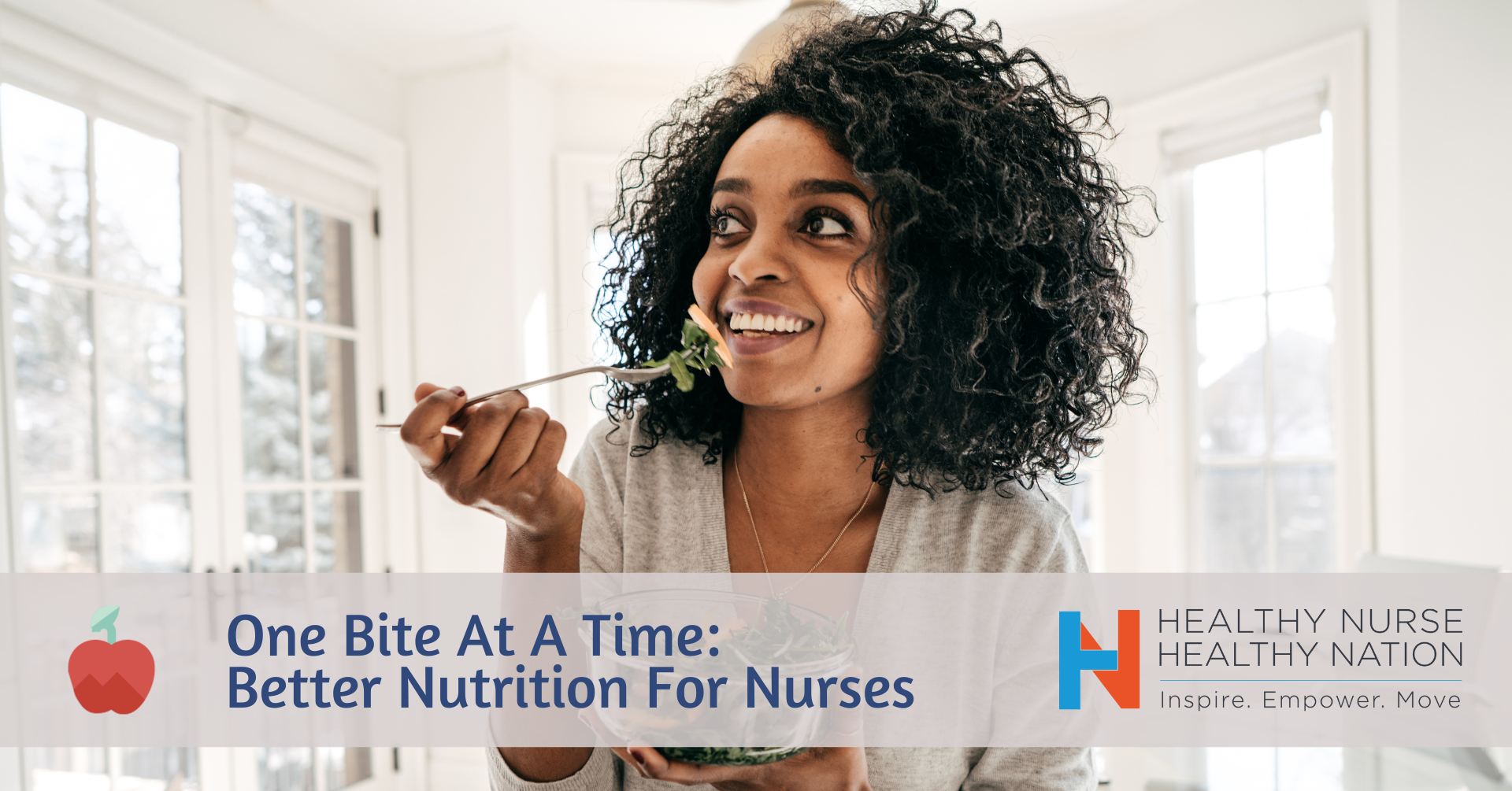Healthy Nurse, Healthy Nation™ Blog - One Bite At A Time: Better Nutrition For Nurses
Published
A balanced diet is a critical piece of the health picture. Unfortunately, many nurses face an uphill battle when it comes to eating right.
Federal dietary guidelines recommend adults eat 5 or more servings of produce daily. Yet according to the Healthy Nurse, Healthy Nation's HealthyNurse Survey, nurses report eating about 2.5 servings of fruits and vegetables each day.
That survey also revealed that nurses' average body mass index (BMI) falls in the overweight range, at 27.58.
Those stats make sense when you consider the challenges nurses often face:
Despite those obstacles, there are good reasons for nurses to reconsider their food choices. Poor nutrition can not only lead to weight gain, but also increase the odds of problems including stroke, diabetes, infertility, cardiovascular disease, and some types of cancer.
Individual nurses can take steps to improve their own daily diets, but they can’t do it alone. The organizations that employ them also have to play a part in creating workplace cultures that encourage smart food choices. In addition, as role models, educators, and advocates for good health, nurses can inspire their patients to establish healthier eating habits, one bite at a time. Take a look at our nutrition blogs for great tips to improve your eating habits and review our #healthynurse Spotlight series for inspiration from other nurses.
RELATED: 14+ Healthy Food Substitutions for More Mindful Meals
Find out how Healthy Nurse, Healthy Nation and other nursing organizations are addressing obesity head on at the Nurses Obesity Network, sponsored by Novo Nordisk.
Find this helpful? Share this post to your networks on social media by clicking on the links on the left side of your screen. Follow us on Facebook, Instagram, and Twitter!
Source List:
Healthy Nurse, Healthy Nation: Year 4 Highlights 2020-2021. American Nurse Journal.
Why Stress Causes People to Overeat. Harvard Medical School.
Updated 2/16/22
 Have you joined the Healthy Nurse, Healthy Nation (HNHN) Grand Challenge yet? Join us today!
Have you joined the Healthy Nurse, Healthy Nation (HNHN) Grand Challenge yet? Join us today!
That survey also revealed that nurses' average body mass index (BMI) falls in the overweight range, at 27.58.
Those stats make sense when you consider the challenges nurses often face:
- Many nurses don’t get a chance to take meal breaks during their shifts. That can force them to grab snacks from the vending machine or reach for a donut from the break room when they have a few minutes to spare.
- Hectic work schedules means nurses often resort to convenience options. Nurses reported eating "out" such as with fast food once or twice a week.
- Only 52% of nurses report they have access to healthy food during work hours. Many hospital cafeterias, for instance, still offer a lot of fried foods and sweets. Some hospitals even have fast-food restaurants on site.
- Patients frequently thank nurses with goodies like chocolates or homemade cookies. While it’s nice to be recognized for a job well done, resisting tempting treats can be a challenge.
- Stress eating is a real phenomenon. Research shows that chronic stress can interfere with the hormones that regulate appetite and also drive people to choose foods that are high in fat and sugar. That’s notable for nurses, given that 63% report experiencing stress at work.
Despite those obstacles, there are good reasons for nurses to reconsider their food choices. Poor nutrition can not only lead to weight gain, but also increase the odds of problems including stroke, diabetes, infertility, cardiovascular disease, and some types of cancer.
Individual nurses can take steps to improve their own daily diets, but they can’t do it alone. The organizations that employ them also have to play a part in creating workplace cultures that encourage smart food choices. In addition, as role models, educators, and advocates for good health, nurses can inspire their patients to establish healthier eating habits, one bite at a time. Take a look at our nutrition blogs for great tips to improve your eating habits and review our #healthynurse Spotlight series for inspiration from other nurses.
RELATED: 14+ Healthy Food Substitutions for More Mindful Meals
Find out how Healthy Nurse, Healthy Nation and other nursing organizations are addressing obesity head on at the Nurses Obesity Network, sponsored by Novo Nordisk.
Find this helpful? Share this post to your networks on social media by clicking on the links on the left side of your screen. Follow us on Facebook, Instagram, and Twitter!
Source List:
Healthy Nurse, Healthy Nation: Year 4 Highlights 2020-2021. American Nurse Journal.
Why Stress Causes People to Overeat. Harvard Medical School.
Updated 2/16/22
 Have you joined the Healthy Nurse, Healthy Nation (HNHN) Grand Challenge yet? Join us today!
Have you joined the Healthy Nurse, Healthy Nation (HNHN) Grand Challenge yet? Join us today!
Blog Nutrition
08/31/2017 11:07am CDT



Post a Comment or Question